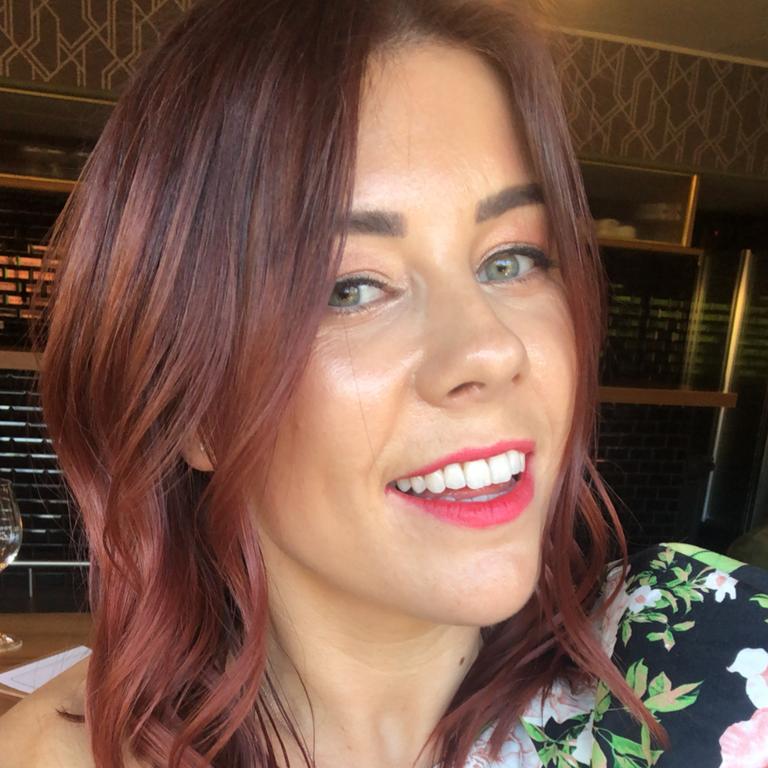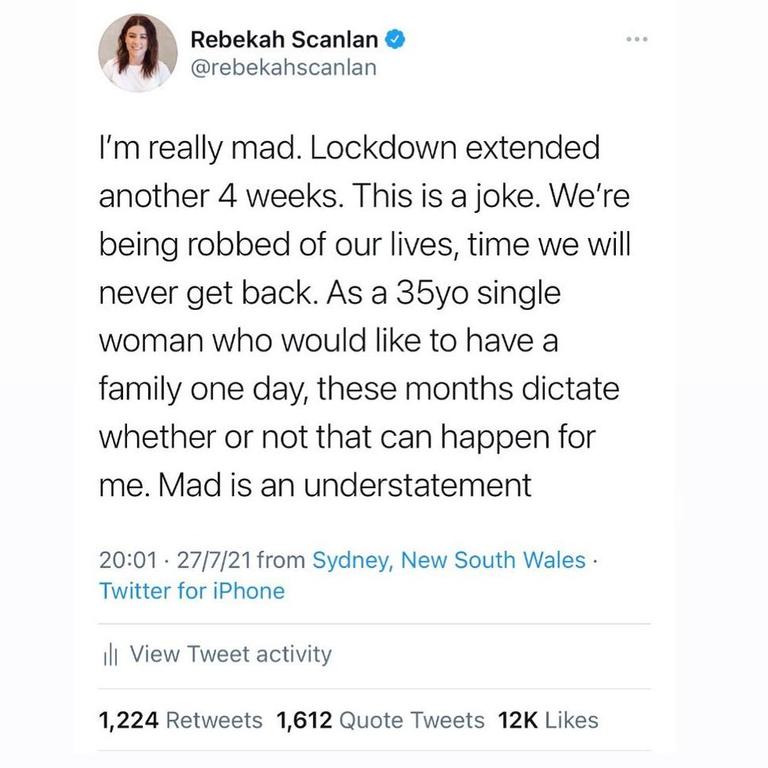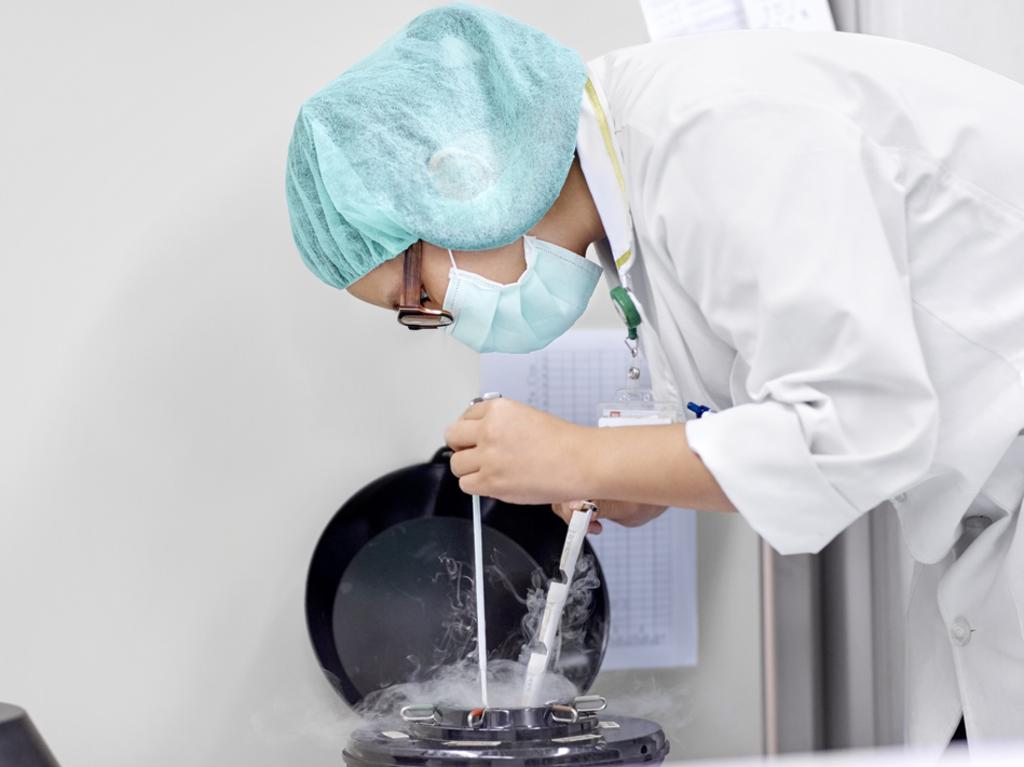Being worried about my fertility isn’t an entitled millennial whinge
A single 35-year-old complained about the “dire” dating scene and her fertility concerns during the pandemic, and she was brutally lashed.
OPINION
Modern dating is a minefield at the best of times, let alone when you add QR codes, social distancing and face masks into the mix.
It makes the already difficult task of finding a “good one” amid the sea of never ending red flags – and those who just want to get a leg over – even harder than it was before.
It is impossible to meet someone in a nightclub or a bar, and don’t get me started on the cesspool known as dating apps. Even when you score a date with someone who doesn’t appear to be anti-vax or a covid-conspiracist (I wish I was joking), the natural flow of meeting up with them has been completely disrupted.
You can’t meet someone for a drink and see how the night goes. Even going to dinner is difficult – it requires a booking and down payment which is a big ask considering the chance of being ghosted is very real.
Granted, none of this makes dating impossible, but it certainly steals spontaneity – a widely credited ingredient for romance.
Juggling those covid-dating rules has become a moot point in recent weeks with the return of the lengthy lockdown in Sydney – which, for a 35-year-old woman, is a big deal.
The reality for me is that covid, and the endless lockdowns, come at a time when my biological clock is ticking – fast – and could cost me a chance at motherhood.
I get that lockdowns are devastating for everyone – they kill small businesses, families across different states have been separated for months, and there are thousands of Australians stranded overseas, unable to get home. But for me, the crisis is very personal.
It’s this feeling of frustration that led me to bash out 140 characters on Twitter when news broke that Sydney’s lockdown was being extended by four weeks.
“I’m really mad. Lockdown extended another 4 weeks. This is a joke. We’re being robbed of our lives, time we will never get back,” my tweet began. “As a 35-year-old single woman who would like to have a family one day, these months dictate whether or not that can happen for me. Mad is an understatement.”
RELATED: Three red flags to watch out for when dating

Boy, did those few words resonate with the masses – more than 12,000 ‘liked’ my tweet – but there was also an avalanche of people who thought the price I’m likely to pay wasn’t worthy of my public complaint.
Some of the nicer critics rightfully pointed out that I was single before the pandemic, so I couldn’t blame my situation on lockdown.
I have been aware of the ticking of my biological clock for a while. It’s been shoved down my throat by society at every opportunity since turning 30, long before coronavirus became an everyday word in our vocabulary.
Dr Mikayla Couch, an obstetrics and gynaecology registrar at NSW Health, said many women feel this suffocating panic.
“The biological clock is a metaphor that society has created to describe the sensation of pressure many people feel when they are at the peak or past their peak of reproductive years,” she said.
She explained the average age of women having their first child had increased over time, largely because we are “seeking work and university studies before starting a family”.
In 2009, 27.9 years was the age women would, on average, have their first child. By 2019, that had risen to 29.4.
While men waiting until their 30s to settle down is often encouraged, for women it is seen by society as a “short-falling”.

This was evident in the backlash I received to the admission of my fertility fears.
I was called a “whining entitled adult” and told by many men I was well past my sell by date. Some even pleaded with me not to procreate, claiming a child born with my “wholly abhorrent selfishness” is something the world could do without.
Others tactfully told me to “get a grip”, labelling me a snowflake who was prioritising my own wants over the needs of the community.
These angry people were missing the point.
This isn’t a competition about who is getting screwed over the most by covid. Trust me, that’s a game no one wins.
Dr Couch is a single, 31-year-old Bundjalung woman who lives with anovulatory polycystic ovarian syndrome which means she doesn’t ovulate and has no chance of falling pregnant naturally. She’s also a fertility expert who informs me I’m not alone.
“We are now in the midst of the second year of the covid pandemic and for some women with lessening egg numbers, the fear of not having children is real,” she said.
“Everyone has their own priorities, but if starting a family or at least having the option of starting a family is your priority, these last two years will have impacted your fertility journey.”
This was echoed by women online, many sharing their own frustrations, including tales of fertility treatments being placed on hold and partners being stuck interstate or overseas – preventing them from starting their baby-making plans.
“It’s really hard when your biological clock is ticking & for (the) last 18 months all egg freezing & fertility treatments (& partner finding) disrupted. You can’t understand it unless you are living it,” one woman wrote.
Another stressed that the “indefinite revolving door of lockdowns impede the ability to create new relationships and build trust”.
I'm in the same boat as you, but that's very selfish thinking. We can wait 4 weeks. Your desire to have a child IS NOT more important than the lives in our community (including your family, friends, and yourself). We all have to rise up, protect each other, and deal with it.
— Razer / Corinne (@razerathane) July 29, 2021
Empathy? For the whining entitled "adult" who can't seem to endure a short-term simple request to protect her fellow humans? Empathy for her?
— KTF96 (@KTF96) July 29, 2021
Or, and God I hope this is the case, was your comment meant for the whining, entitled "adult".
There are options for women who share my fertility concerns, but that costs money – another factor hugely impacted by the pandemic.
Freezing of eggs is one of the more common choices, with Dr Couch explaining the price varies between companies and what options individuals make.
“It’s roughly $8000 to $10,000 depending on how many cycles you do plus ongoing fees of ongoing freezing,” she said.
I can’t have that treatment right now. Even if I had the cash to spare – spoiler: I don’t – non-urgent elective surgeries have been suspended in NSW from August 2, placing many fertility treatments on pause.

The pandemic certainly isn’t to blame for anyone’s fertility or relationship struggles, but it certainly amplifies it.
Australia rightly has compassion for the countless small business owners who are on the brink and the couples who have lost thousands of dollars every time a lockdown forces their wedding plans into chaos — but it appears there’s a real lack of empathy and understanding for someone worried their dream of having a family is slipping away from them.
It certainly seems my tweet made people squirm. Dr Couch suspects it is down to the fact fertility and pregnancy issues are “prohibited topics”.
But fertility is a dire covid crisis, one no one is talking about, and I’ve got no problem being the “entitled” millennial who brings it to attention.
Continue the conversation @RebekahScanlan | rebekah.scanlan@news.com.au




